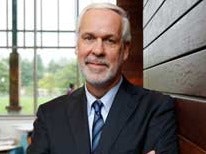Southern New Hampshire University (SNHU) and the Chicago-based nonprofit LRNG are merging to provide an innovative solution that aims to create “seamless connections” between education and the workforce, particularly for those in underserved communities.
 Dr. Paul LeBlanc
Dr. Paul LeBlancWith the new partnership, SNHU and LRNG will work with cities, employers and community-based partners to develop “digital badges,” “learning playlists” or other degree programs in alignment with a city’s educational and workforce needs. The organizations will reach “upstream” to serve pre-college young people and reach “downstream” to serve older adult learners, said SNHU president and CEO Dr. Paul LeBlanc.
“We are very, very mission driven and we really have a focus on unlocking the talent that we believe exists in every community, including poor communities,” LeBlanc added. “It’s not a lack of talent. It’s a lack of opportunity.”
SNHU and LRNG collectively serve more than 180,000 learners through their programs, ranging from middle-school aged students to adult workers.
LeBlanc added that LRNG’s work is “complimentary” to SNHU’s in that the private, mostly-online university can help the nonprofit scale its efforts around connecting learning to career opportunities, while the nonprofit can help university leaders rethink how they structure learning experiences for young people.
Launched in 2015, LRNG’s youth-inspired work currently reaches 19 American cities. SNHU and LRNG – as the university’s “community impact arm” – will launch their new learning model in Birmingham, Alabama and Chicago, with plans to expand to other cities as the initiative develops.
“Our goal is to build this national effort, but at a city-by-city basis,” LeBlanc said.
SNHU and LRNG will use a research team and analyze “big data” to assess regional and local education and workforce needs. In addition, leaders will meet with key stakeholders in the workforce community.
“This could be everybody from directors of workforce investment boards to CEO’s of local employers … to really understand what their challenges are and any of their talent needs,” LeBlanc said. “The answers to those questions can look very, very different from city to city.”
Offering digital badges or “micro credentials” to learners has increasingly gained momentum as workforce leaders express concerns about a lack of skilled laborers entering various sectors.
SNHU and LRNG’s model will give learners access to LRNG’s digital badges and “learning playlists” and SNHU’s competency-based College for America program, along with their traditional online associates or bachelor’s degrees.
With digital badges, “we’re really trying to shorten the gap between what students are learning and its relevance in the world,” Connie Yowell, executive vice president and CEO of LRNG, told EdSurge. “We think that will have a huge impact on people’s motivation for learning and their engagement in learning.”
This “continuum of credentials” as LeBlanc calls it, can become stackable as learners move from non-credit bearing digital badges to degrees or the workplace.
“Not everybody needs a degree every time they step into the learning ecosystem,” he cautioned. “Sometimes, it’s a micro credential that allows them an ‘on-ramp’ to work.”
While the primary learning platform is online, the partnership will cultivate learning in a hybrid way, leading to the creation of mini-campuses “ideally” in the neighborhoods SNHU and LRNG will serve, leaders said. “Try to think of a WeWork for education,” LeBlanc added, referring to the company that provides communal office spaces.
Established through collaborations with local library systems, local community colleges or workplaces, for instance, these multi-purpose and flexible spaces will give learners access to technology, a quiet place to study and additional support services such as college counseling, FAFSA support and more. SNHU and LRNG plan to further explore what learners want or need depending on the city context, LeBlanc said.
Yowell said LRNG is thrilled about the merger with SNHU. LRNG’s staff will join SNHU’s Community Partners team, according to the university.
“To establish real and meaningful pathways to the middle class for youth that need them most, the educational community must build seamless connections between learning and work, and passion and opportunity throughout a learner’s life,” she said in a statement. “Joining forces with SNHU is an extraordinary effort to do just that and make a difference in the lives of our learners and their communities.”
Similarly, LeBlanc said SNHU can learn a lot from the way LRNG and its leadership approaches their work, highlighting how the organization centers the students they are serving in the construction of their learning experience.
Going forward, SNHU and LRNG leaders’ aspirations are to serve hundreds of thousands of learners.
“What we really want to work hard at is how do we re-engage students who may be at high risk of dropping out of both education and work,” LeBlanc said, “and then how do we help them aspire to something better for their lives.”
Tiffany Pennamon can be reached at [email protected]. You can follow her on Twitter @tiffanypennamon.















